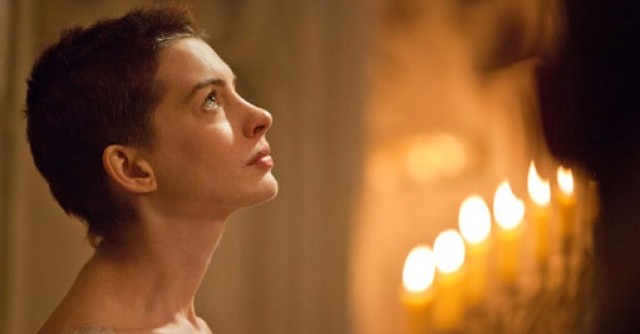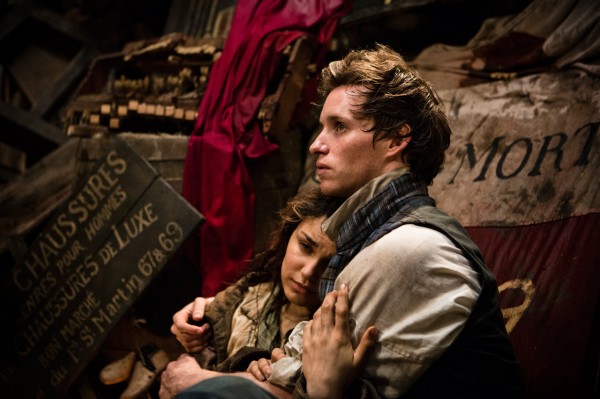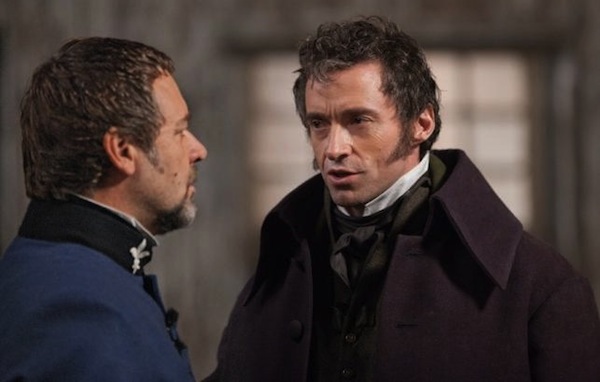Les Misérables Review
There are few musicals like “Les Misérables,” an operetta lined with incredible music from start to finish, with a story so grand and tremendous that somehow manages to fit on a Broadway (or West End) stage.
Needless to say, Claude-Michel Schonberg and Alain Boublil’s story has been ripe for a film adaptation since the English version opened in London in 1985, a chance to place this larger-than-life production in an environment with no physical confines or limitations. With the keys in the hands of Tom Hooper (“The King’s Speech”), one would expect something extravagant, but surprisingly, the Oscar winner chooses to do the opposite — to zoom in on the story and its characters in search of greater depth.
It’s this choice that completely determines the effectiveness of this take on “Les Mis.” As anyone familiar with the musical knows, you’re not going to walk out of any film version disappointed with the music and lyrics or the quality of the overall story — they guarantee the film a certain measure of success. Instead, it becomes all about presentation.
Hooper’s primary technique for telling this story is the close-up. If he and cinematographer Danny Cohen got any closer, in fact, you’d swear the camera would smack into the actors’ faces. With so much of the music being sung by one character at a time — characters who are usually pouring their souls out — it makes sense, but there’s little breathing room for the audience. Stars Hugh Jackman, Russell Crowe, Anne Hathaway and more are literally right there; the makeup department had to be utterly scrupulous to be sure.
But Hooper doesn’t just expose his actors physically, he also does so vocally. With the choice to film all the singing live on set as opposed pre-recording tracks in studio for the actors to lip-sync to, their voices become the object of audience scrutiny. With the lens so close on these characters, the actors had no margin for error in their performances, so it’s truly a compliment to say that there is some truly incredible acting in “Les Misérables.”
Jackman and Hathaway excel the most with this technique as Jean Valjean and Fantine, respectively. Valjean is the protagonist in this large ensemble, a man released from prison on parole for stealing a loaf of bread, who after remaking himself eight years later, promises the dying Fantine that he’ll look after her daughter, Cosette (played later on by Amanda Seyfried).
Interestingly, their best work comes at the very beginning of the film. As the prison-worn down-on-his-luck Valjean who is given a second chance, Jackman sets the bar for the film’s emotional intensity with “What Have I Done?” only to be outdone by Hathaway, who, despite minimal screen time, delivers the iconic “I Dreamed a Dream” with an intensity that really hammers home the lyrics in a way no previous renditions have ever done. It’s incredible, though sadly it goes unmatched for the entire rest of the movie.
Young up-and-comer Eddie Redmayne as student rebellion leader Marius and West End starlet Samantha Barks as the street urchin Eponine also succeed when the camera fixes squarely upon them in their respective songs “Empty Chairs at Empty Tables” and “On My Own.”
As much as the close-ups really highlight and enhance the acting, some members of the cast struggle with it. Russell Crowe has a lot of trouble with Inspector Javert, both vocally (at the beginning at least) and emotionally. He’s a tricky character who’s hard to empathize with in the first place, and Crowe just seems uncomfortable during his two huge solos.
Opinions will vary on the overall sound of “Les Misérables” because of the choice to do on-set singing. Some lyrics become a bit lost when multiple people sing at once, and the actors generally choose to restrain their voices or even speak some of the lyrics rather than belt them, which given the choice and the film’s intimate nature, makes sense. Great pitch is somewhat sacrificed for a raw quality that benefits the acting. The entire film is really built around the performances.
Usually, when a film doesn’t quite have the emotional impact it should wield, it’s a lack of introspection and intimacy that can be blamed, but in this case, it’s when “Les Misérables” fails to get big enough that it lacks that power to hit all of the story’s several emotional high points. We never get that big sense of scale because of Hooper’s preoccupation with the characters and that intimacy. The wide shots in the film are mostly sweeping pans to establish change in time and location, and they’re very effects-heavy.
It’s odd, because what made “The King’s Speech” such an excellent film from a technical standpoint was the way Hooper beautifully incorporated the scenery in almost every scene. The rich detail of the set decoration, props and costumes all came through. Here we can pretty much only judge the costumes from the waist up. Half the shots in the movie could’ve been filmed with actors not wearing pants and we wouldn’t have known it.
The trade off is that we get some of the very best performances in a movie musical of all time. These are star-making turns for Redmayne and Barks, and when you stop to consider at any point in the film that the guy playing Valjean also plays Wolverine, you’ll have a whole new level of respect for Jackman. He and especially Hathaway will wow you like no acting performance has in quite some time.
“Les Misérables” has its missteps to be sure, but it’s a worthy adaptation that utilizes its talent to impressively bring new insight to a stage musical heard and seen countless times all over the world.
4/5 Stars
Directed by Tom Hooper
Written by William Nicholson (screenplay), Claude-Michel Schonberg and Alain Boublil (musical), Victor Hugo (novel)
Starring: Hugh Jackman, Russell Crowe, Anne Hathaway, Eddie Redmayne








0 Comments
You can be the first one to leave a comment.